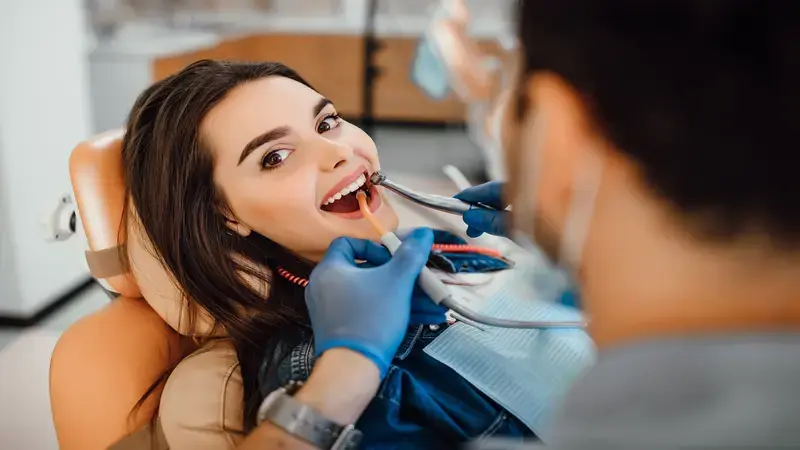Dentists all over the world will advise against consuming dairy products right after the treatment, such as milk, cheese, or yogurt. Given the nutrient-rich nature of dairy products and their well-known advantages for bone health—who hasn’t heard that drinking milk helps to maintain strong teeth?—patients frequently find this advice confusing. In this article, we go through the nuances of this recommendation to steer clear of dairy products during the critical phase of dental implant healing.
The Healing Process and Dairy
The primary objectives during the initial phases of recovery are to guard against infection and make sure the implant effectively fuses with the jawbone. Despite being healthy, dairy products might endanger the delicate healing process:
- Possibility of infection
First off, eating dairy products may make you more susceptible to bacterial development. Especially when kept at room temperature, dairy products can serve as a breeding ground for dangerous germs. After surgery, putting such germs in the mouth could potentially hinder healing and raise the risk of infection.
- Blood clotting prevention
Second, even softer dairy products like yogurt or ice cream might affect the implant, slowing the healing process. Chewing is frequently prohibited following an implant treatment to reduce extra stress on the implant site.
- Antibiotics and dairy
If you’ve ever had a dental implant, you know some dentists go one step further and avoid infection by immediately prescribing antibiotics after the procedure. When using certain antibiotics, such as tetracyclines, dairy products can reduce the efficiency of the medication.
It occurs because the antibiotic becomes less effective in warding off possible infections due to a binding reaction with the calcium present in dairy products. Although not all types of antibiotics are affected by this interaction, it is typically wise to take caution and stay away from dairy when taking any post-procedural antibiotics.
Blood Clotting and Dairy
Following your dental implant treatment, a blood clot will normally form at the surgical site. This blood clot is an important part of the healing process. This blood clot helps speed up recovery by shielding the underlying bone and nerve endings, but dairy consumption can prevent this. Dairy, which has a lot of calcium, may prevent coagulation, causing you to bleed for longer.
Inflammation and Dairy
Any surgical operation, including dental implants, will typically result in inflammation. It is the body’s natural defense mechanism acting to defend the site of injury. According to some research, the inclusion of saturated fats in various dairy products, especially full-fat dairy alternatives, may lead to inflammation. However, excessive inflammation can impede healing and create discomfort.
Although the relationship between dairy consumption and inflammation is ambiguous and varies from person to person, refraining from dairy during the first period of recovery after dental implant surgery can be a proactive move to reduce any potential rise in inflammation.
What should I eat After Dental Implant surgery?
Certain foods can hinder the healing process for dental implants. After oral surgery, there are several recipes for soft foods that are healthier.
- Vegetables and Fruit
Fruits and vegetables are the ideal post-dental implant surgery meal options because they are naturally soft, packed with vitamins and nutrients, and consequently have less impact on your implant. Eat berries, peaches, and oranges, among other fruits. As well as making soups and smoothies, boiling veggies to give them a soft texture is advised.
- Eggs
Eating the correct protein is essential for good health. Eggs are soft to eat, high in protein and calcium, and may be prepared in a variety of ways depending on your preferences.
- Potato dishes or Boiled potatoes
High-fiber foods include potatoes, which you can flavor by adding cheese and gravy. The most suggested method of cooking potatoes is with a mask to maintain the implant’s health.
- Soups made with broth
Soup is often a nutritious food choice. It is advised to eat soup warm rather than heated. Soup has the benefit of not requiring chewing, and it may also be a rich source of protein.
- Oat and wheat cereals
Wheat and oat cereals, also referred to as cooked cereals, should be consumed after surgery. The flavor can be altered by adding flavorings like honey.
- Plant-based substitutes
Almond, soy, or oat milk are a few examples of plant-based milk that can be a viable dairy substitute. They frequently have calcium and other necessary elements added to them. However, be wary of their sugar content because it might affect oral health; whenever possible, choose unsweetened varieties.
- Bone bouillon
Bone broth is a healthy, palatable alternative that offers a good amount of calcium and other minerals like magnesium and phosphorus that are crucial for strong bones.
- Slender leaves
For your healing process, effective sources of calcium are tofu, dark leafy greens, and seafood with bones, like salmon and sardines. Including these in your meals can give you a balanced diet while recovering.
Final Thoughts
Avoiding dairy items can reduce the chance of problems, including infection and dry sockets. To ensure that the dental implant is successfully integrated and to get the greatest long-term results, patients are strongly advised to adhere to the detailed post-operative instructions given by their dental surgeon. These instructions may include dietary recommendations.
FAQ’s
Can I consume dairy products at all during the healing phase?
It’s advisable to avoid dairy products, particularly in the immediate aftermath of dental implant surgery.
Are there alternatives to dairy for obtaining necessary nutrients?
Absolutely. Your dental surgeon recommends calcium-fortified juices, leafy greens, nuts, and supplements.
How long should I avoid dairy after dental implant surgery?
The specific duration to avoid dairy is for at least the initial week or until you receive approval from your dentist.

